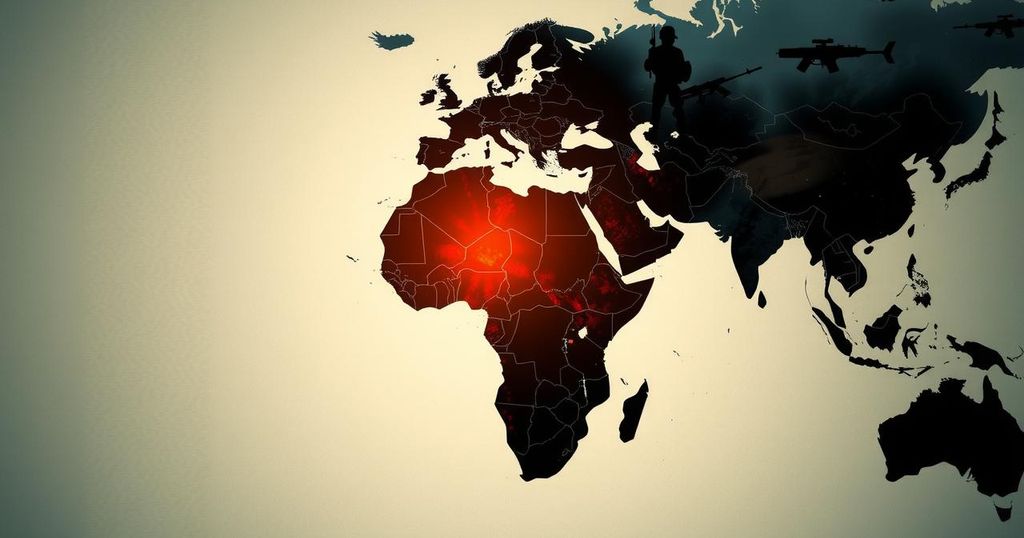DR Congo’s Struggles with Romanian Mercenaries and Military Inefficiency

Approximately 300 Romanian mercenaries hired by the DR Congo army surrendered after a rebel assault on Goma, shattering their hopes for substantial earnings. Contracted for $5,000 monthly wages, they faced stark disparities in compensation compared to regular troops. The situation highlights issues of disorganization within the Congolese military structure and the influence of external military contractors amid ongoing conflict.
Recent events have resulted in a significant setback for nearly 300 Romanian mercenaries engaged by the Democratic Republic of Congo (DR Congo) military amid the conflict against the M23 rebels. Their surrender during a rebel attack on Goma has dashed hopes of lucrative earnings, with contracts promising $5,000 per month for these fighters, a stark contrast to the meager salaries of regular Congolese troops, earning approximately $100.
The Romanian mercenaries were originally deployed to support DR Congo forces in combating the Rwanda-backed M23 rebels, who advocate for the rights of Tutsi minorities in the country. As the offensive in Goma escalated, the Romanians retreated to a United Nations peacekeeping base for safety. Constantin Timofti, a group coordinator, stated that the Congolese army had abandoned the fight, forcing their withdrawal.
Romania’s foreign ministry later confirmed complex negotiations resulted in the handover of the surrendered fighters to Rwanda. Subsequently, footage emerged showing mercenaries being transferred across the border, highlighting the intensity of their predicament. M23 commander Willy Ngoma publicly berated one mercenary, exposing disparities in military compensation between the Romanians and Congolese forces.
Previous reports indicated that Asociatia RALF, a Romanian entity purportedly employing former members of the French Foreign Legion, was the contractor behind the mercenaries. Observers described their presence in Goma as they operated closely with Congolese military units. The organization’s contracts revealed it also engaged in operations across various African nations, reflecting its extensive involvement in military services.
Experts believe the presence of mercenaries marked a critical shift in combat dynamics within the DR Congo, particularly following instability in North Kivu province resulting from the M23’s resurgence. Additional private military companies were contracted to enhance the military’s capabilities and ensure strategic locations were secured. However, many instructors were reportedly involved in direct combat rather than solely providing training.
Complicating the situation are the disparities in pay and conditions that have led to frustrations among Congolese forces. One soldier expressed dissatisfaction with their front-line responsibilities, which contrasted starkly with the better compensation for Romanian mercenaries. Although efforts were made by the Congolese government to justify the use of foreign instructors, local soldiers were clearly feeling the effects of unequal treatment within the military structure.
As the conflict continues to unfold, analysts suggest that the chaotic command structure has severely undermined military effectiveness against the M23. Richard Moncrief from the International Crisis Group indicated that streamlining command would improve strategic planning in the region. The fallout from recent events appears to illustrate that disorganized command can significantly hinder operational success.
The Democratic Republic of Congo has been embroiled in conflict for decades, largely due to various armed groups vying for control over valuable mineral resources, particularly in North Kivu province. Amid this turmoil, the Congolese government has sought external support through private military contractors, including Romanian mercenaries, to bolster its military efforts against groups such as the M23 rebels. The reliance on these mercenaries has raised concerns, particularly regarding disparities in pay and operational effectiveness, as well as the challenges presented by muddled command structures within the DR Congo military.
The involvement of Romanian mercenaries in DR Congo underscores the complexities of modern conflict, highlighting issues of inadequate compensation and leadership within military ranks. Their recent surrender signifies not only a personal failure for the mercenaries but also raises broader questions about the efficacy of employing foreign fighters in a deeply fractured military context. The need for coherent command and equitable treatment of soldiers is more pressing than ever as the conflict persists.
Original Source: www.bbc.com






